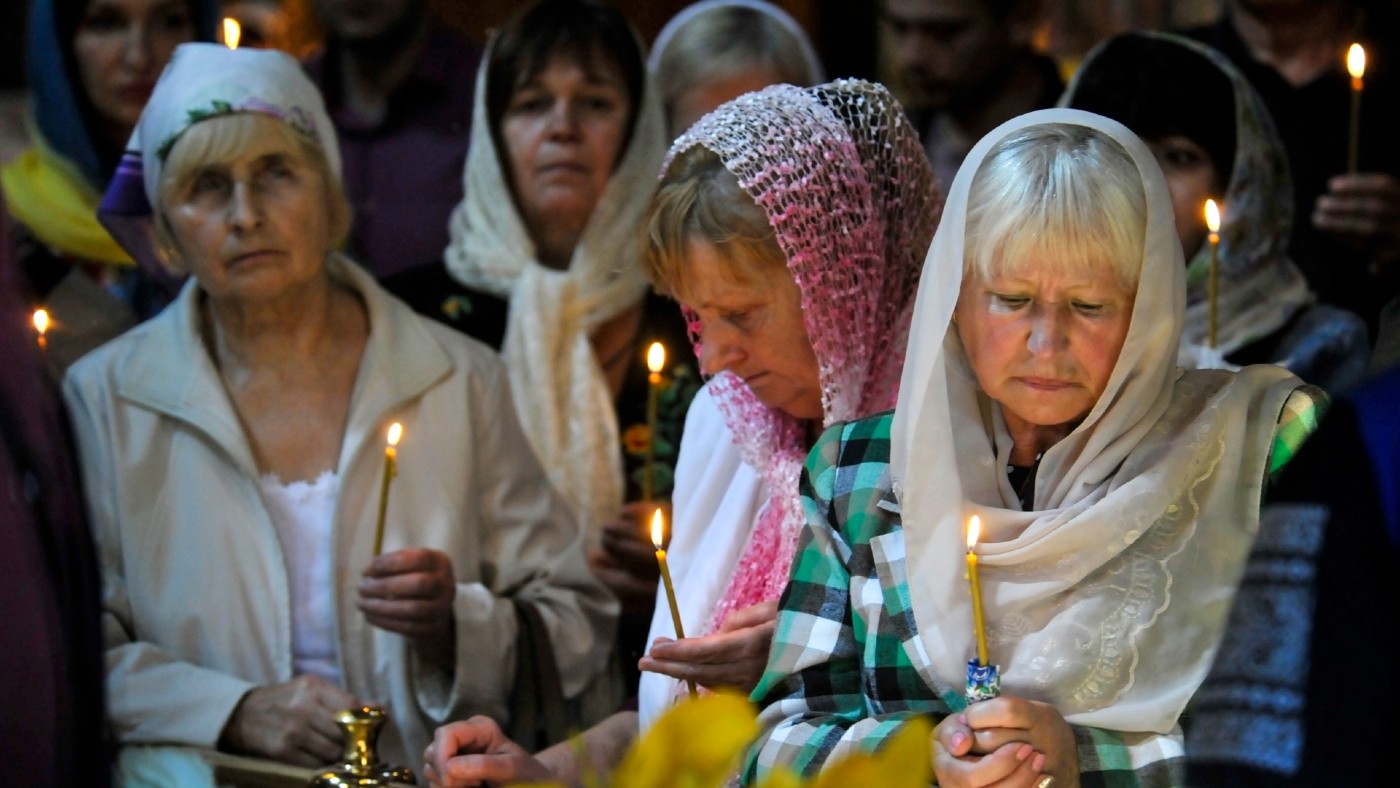Vladimir Putin’s ruthless strategy: ‘standing back and just shelling’
By dragooning Russia’s ‘impoverished minorities’ into the army, he can keep grinding on

A free daily email with the biggest news stories of the day – and the best features from TheWeek.com
You are now subscribed
Your newsletter sign-up was successful
Ukrainian officials have a new saying, said Thomas Friedman in The New York Times: “All the dumb Russians are dead.” It’s a “backhanded compliment”, meaning that, after suffering ruinous casualties – at least 15,000 troops have been killed – Russian forces have devised an effective strategy. It involves “standing back and just shelling and rocketing Ukrainian cities in the east, turning them to rubble and then inching forward”.
And Vladimir Putin clearly intends to push on. He hasn’t got nearly enough troops to meet his original invasion objectives, but by dragooning Russia’s “impoverished minorities” and Ukrainians from separatist territories into the army, he can keep grinding on. He clearly hopes that soaring energy and food prices in Europe will “fracture the Nato alliance”.
And he has a trump card, said Roger Boyes in The Times: he can cut off Europe’s gas. Last week, Germany was given a taste of this when the crucial Nord Stream 1 gas pipeline was closed for ten days for “maintenance”. Russia has accumulated $95bn of gas and oil revenues over five months of war. “Putin can get by for a while without our cash; Europe cannot, he calculates, get through a winter without his gas.”
The Week
Escape your echo chamber. Get the facts behind the news, plus analysis from multiple perspectives.

Sign up for The Week's Free Newsletters
From our morning news briefing to a weekly Good News Newsletter, get the best of The Week delivered directly to your inbox.
From our morning news briefing to a weekly Good News Newsletter, get the best of The Week delivered directly to your inbox.
Psychological warfare
Since the fall of Luhansk early this month, there has been an “operational pause” in the main Donbas theatre, said Gabriel Gavin on Reaction. Moscow has turned instead to long-range bombings of civilian areas as a form of psychological warfare. Last week, at least 23 people died and more than 200 were injured when cruise missiles smashed into the western city of Vinnytsia, more than 300 miles from the front line.
But Ukrainian officials warn that Russian preparations for the next offensive are already under way. “The fighting now seems to hinge on the ability to fire on the enemy from afar.” So the question, as ever, is whether the West can ship in sufficient hardware to balance out Russia’s ability to “out-manufacture” Ukraine in munitions. It all hangs in the balance, said Lionel Barber in the FT – “whether the law of the jungle or the rule of law will prevail”.
Sanctions are working
Many seem to think that, the longer the war lasts, “the better Russia’s chances will become”, said David Ignatius in The Washington Post. But this is not necessarily so. There are clear signs, from Russian officials themselves, that sanctions are working, “albeit slowly”. Sanctions “have practically broken all the logistics in our country”, according to transport minister Vitaly Savelyev.
High-tech imports – crucial for the military, communications and the energy sector – have been slashed. Semiconductor imports are reportedly down 74% compared with a year ago. Tank production at Russia’s two major plants has been stopped or limited. The head of Russia’s largest bank, Sberbank, thinks it will take a decade to return the economy to 2021 levels. Russia is “a country that’s in slow-motion collapse”. Putin “plays his hand boldly. But he’s holding fewer high cards than it might appear.”
A free daily email with the biggest news stories of the day – and the best features from TheWeek.com
-
 The ‘ravenous’ demand for Cornish minerals
The ‘ravenous’ demand for Cornish mineralsUnder the Radar Growing need for critical minerals to power tech has intensified ‘appetite’ for lithium, which could be a ‘huge boon’ for local economy
-
 Why are election experts taking Trump’s midterm threats seriously?
Why are election experts taking Trump’s midterm threats seriously?IN THE SPOTLIGHT As the president muses about polling place deployments and a centralized electoral system aimed at one-party control, lawmakers are taking this administration at its word
-
 ‘Restaurateurs have become millionaires’
‘Restaurateurs have become millionaires’Instant Opinion Opinion, comment and editorials of the day
-
 Corruption: The spy sheikh and the president
Corruption: The spy sheikh and the presidentFeature Trump is at the center of another scandal
-
 Putin’s shadow war
Putin’s shadow warFeature The Kremlin is waging a campaign of sabotage and subversion against Ukraine’s allies in the West
-
 Alexei Navalny and Russia’s history of poisonings
Alexei Navalny and Russia’s history of poisoningsThe Explainer ‘Precise’ and ‘deniable’, the Kremlin’s use of poison to silence critics has become a ’geopolitical signature flourish’
-
 The fall of the generals: China’s military purge
The fall of the generals: China’s military purgeIn the Spotlight Xi Jinping’s extraordinary removal of senior general proves that no-one is safe from anti-corruption drive that has investigated millions
-
 What happens now that the US-Russia nuclear treaty is expiring?
What happens now that the US-Russia nuclear treaty is expiring?TODAY’S BIG QUESTION Weapons experts worry that the end of the New START treaty marks the beginning of a 21st-century atomic arms race
-
 Epstein files topple law CEO, roil UK government
Epstein files topple law CEO, roil UK governmentSpeed Read Peter Mandelson, Britain’s former ambassador to the US, is caught up in the scandal
-
 Iran and US prepare to meet after skirmishes
Iran and US prepare to meet after skirmishesSpeed Read The incident comes amid heightened tensions in the Middle East
-
 Syria’s Kurds: abandoned by their US ally
Syria’s Kurds: abandoned by their US allyTalking Point Ahmed al-Sharaa’s lightning offensive against Syrian Kurdistan belies his promise to respect the country’s ethnic minorities